|
|
|
Sort Order |
|
|
|
Items / Page
|
|
|
|
|
|
|
| Srl | Item |
| 1 |
ID:
133643
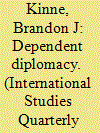

|
|
|
|
|
| Publication |
2014.
|
| Summary/Abstract |
Diplomatic recognition is an essential tool of statecraft but remains largely unanalyzed by political scientists. Two recent trends in diplomatic practice raise notable puzzles: (i) use of diplomatic ties to signal (dis)approval of a regime or its policies, based largely on cues from diplomatic partners, and (ii) reliance on diplomatic missions as a means of securing prestige in the international system. I argue that both trends are the result of network influences. States face resource constraints and must choose diplomatic partners wisely, but they lack complete information about the risks and benefits of extending diplomatic recognition. To solve this informational dilemma, they condition recognition on the diplomatic activity of others. First, states send missions to countries that host missions from their own diplomatic partners, which increases the strength of diplomatic signals and reduces political risks. Second, states send missions to countries that host large numbers of missions in general (that is, "prestigious" countries), which increases their capacity for information gathering. In general, a state's decision to extend or retract diplomatic recognition depends heavily on the decisions of other states. Employing novel network methodologies, I show that these endogenous network influences are among the most consistent and substantively powerful determinants of diplomatic recognition.
|
|
|
|
|
|
|
|
|
|
|
|
|
|
|
|
| 2 |
ID:
153616
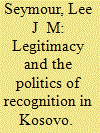

|
|
|
|
|
| Summary/Abstract |
How do contemporary secessionist movements gain international recognition of their claims to self-determination? I argue that international recognition is forthcoming when a sufficient number of states believe a claim to self-determination ought to be accepted. That is, states recognize claims to self-determination when they perceive them to be legitimate. To convince outsiders of the legitimacy of their claims, separatist movements invoke resonant norms and symbols in a moral economy that structures decision-making. I contrast this argument with prevailing explanations of recognition dynamics. To illustrate the argument, I examine the diplomacy surrounding Kosovo’s independence bid and unilateral secession.
|
|
|
|
|
|
|
|
|
|
|
|
|
|
|
|
| 3 |
ID:
140835
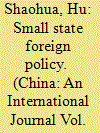

|
|
|
|
|
| Summary/Abstract |
Despite the post-World War II emergence of many small states and growing economic interdependence, small state foreign policy still gets short shrift in international studies. This article seeks to enhance our understanding of the subject by examining the diplomatic recognition of Taiwan. At the time of writing, 23 countries in the world have picked Taiwan over China. This is puzzling at first sight, since China is much more powerful than Taiwan, and a vast majority of countries pick China over Taiwan. This article shows that a full understanding must simultaneously take into account the systemic, domestic and individual levels of analysis. This research lends itself to structural realism, which stresses the role of structural factors in foreign policies, especially among small states. On the domestic level of analysis, this study identifies three important factors: ideology, economy and geography. For structural and cultural reasons, major leaders of Taiwan’s diplomatic allies are found to have loomed large in the diplomatic recognition of Taiwan.
|
|
|
|
|
|
|
|
|
|
|
|
|
|
|
|
| 4 |
ID:
100977
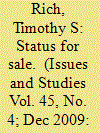

|
|
|
| 5 |
ID:
133531
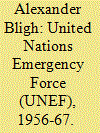

|
|
|
|
|
| Publication |
2014.
|
| Summary/Abstract |
With the conclusion of almost every round of hostilities between Israel and one of its neighbours the idea of international forces is being raised once again. This is basically an improved and revised initiative for stationing international forces to supervise (and perhaps impose) a ceasefire between the parties. In the Arab-Israeli framework, it is in essence the old approach which has been in service since 1948. Only one force, UNEF, stands out as not having been approved by the Security Council and clearly failing its intended but vaguely defined mission. The current analysis leads to the conclusion that in this particular regional conflict, the positioning of international forces must always come within the context of a more comprehensive settlement. That way, by violating a force's mandate, each party would lose either land or diplomatic recognition. Moreover, if a Middle Eastern peacekeeping operation is to take place in the future, it has to include organic units of the warring parties, encouraging peaceful interactions. Such units should reinforce organic units from countries acceptable to all parties. Hopefully, future missions, taking into consideration some of the approaches suggested here, can continue to contribute to regional processes for peace.
|
|
|
|
|
|
|
|
|
|
|
|
|
|
|
|
|
|
|
|
|